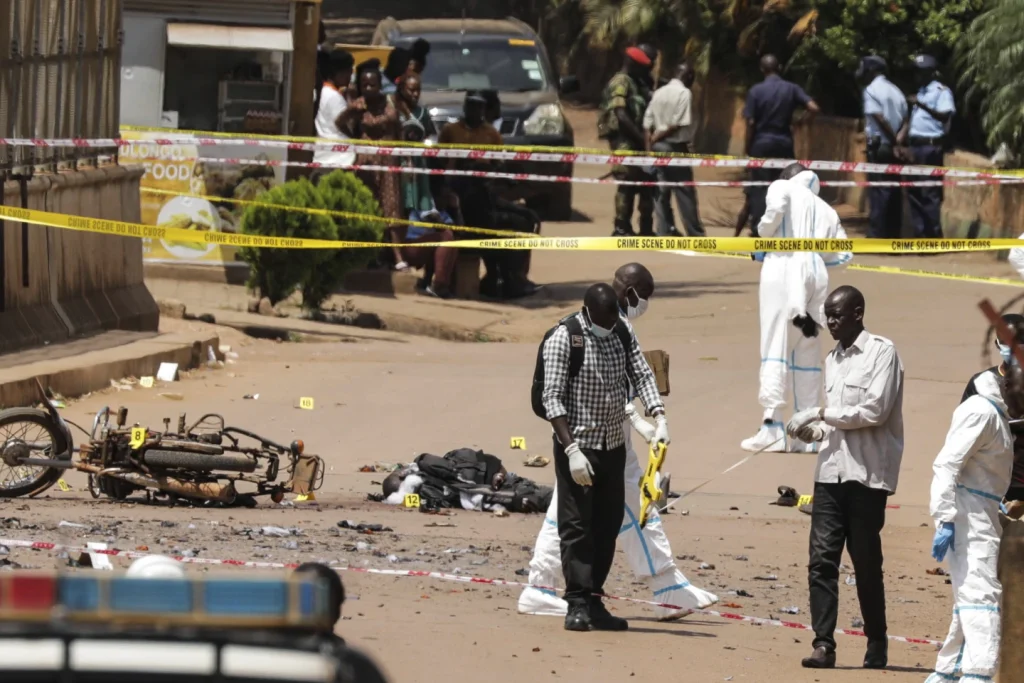Ugandan security forces have ramped up their operations and placed the capital, Kampala, under heightened surveillance following a suspected bomb explosion and a swift counter-terrorism response that resulted in the killing of two armed suspects. The developments unfolded on Tuesday morning, just hours before the country’s Martyrs Day, a significant religious holiday that draws tens of thousands of pilgrims from across East Africa.
The incident occurred near the Munyonyo Martyrs’ Shrine, a prominent Roman Catholic site in southern Kampala. Local media reported that an explosion had taken place in the vicinity, resulting in at least two fatalities. NBS Television indicated the blast may have been caused by a suspected bomb. However, security officials have not yet released a formal statement confirming the exact cause or target of the explosion.
Soon after the reports emerged, the Uganda People’s Defence Force (UPDF) issued a statement confirming that a counter-terrorism unit had engaged two armed suspects in Munyonyo. According to UPDF spokesperson Chris Magezi, the individuals were intercepted and “neutralised” during a proactive security operation. He described the suspects as “armed terrorists” and said the action was part of broader measures to prevent any disruptions to the Martyrs Day activities.
“The security services are on heightened alert to ensure the Martyrs Day celebrations proceed without disruption,” Magezi posted on X (formerly Twitter).
Authorities have since cordoned off the area around the shrine. NTV Uganda reported that security teams restricted public access to roads leading to the Munyonyo site and deployed personnel to maintain order and investigate the incident. The increased military and police presence has been visible, with tactical units conducting searches and monitoring key transit points.
Martyrs Day, commemorated annually on June 3, honors the memory of 45 Christian converts who were executed between 1885 and 1887 under the rule of Mwanga II, then king of Buganda. The day holds deep religious and national significance in Uganda and typically attracts large crowds to sacred sites such as Namugongo and Munyonyo, where pilgrims gather for prayer, worship, and commemoration. Many pilgrims travel on foot from different regions of Uganda and neighboring countries, making security during this period a top priority for the government.
The explosion and subsequent security operation have heightened concerns over the possibility of targeted attacks during high-profile public events. Uganda has in the past faced security threats from various extremist groups, some of which have claimed affiliation with international terrorist networks. These groups have occasionally staged attacks in urban centers, prompting the government to adopt more aggressive counter-terrorism strategies.
President Yoweri Museveni, who has been in power since 1986, has consistently stressed the importance of national security and stability. Under his leadership, Uganda has developed a reputation for maintaining tight security, especially during major events. Nevertheless, recent incidents such as Tuesday’s suspected bombing reflect the ongoing challenges faced by security agencies in preempting and responding to emerging threats.
As investigations continue, authorities have urged the public to remain vigilant and to report any suspicious activities. Security agencies have also reassured citizens and pilgrims that all necessary precautions are being taken to safeguard the Martyrs Day celebrations and ensure that commemorations proceed peacefully across the country.



